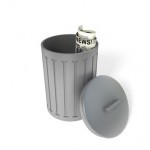
by | Nov 2, 2012
 Below is the full text of the “Letter to the Editor” I sent to several newspapers in Iowa’s 3rd Congressional District. I believe it makes the case against re-electing Leonard Boswell in a concise fashion. If there is anyone you know still on the fence in this race feel free to forward it to them.
Below is the full text of the “Letter to the Editor” I sent to several newspapers in Iowa’s 3rd Congressional District. I believe it makes the case against re-electing Leonard Boswell in a concise fashion. If there is anyone you know still on the fence in this race feel free to forward it to them.
——————————————————————————————————
For the last ten years I have been represented in the U.S House by Rep. Leonard Boswell. During this time I have often disagreed with his positions, but never have I been more convinced that he has grown out of touch with the challenges facing my fellow Iowans, and our nation at large, than I am this year.
The number one piece of evidence proving this has been his approach to our country’s fiscal matters over the last few years. The reason I am so disappointed in Leonard Boswell is because I did something that has seemingly gone way out of style these days, something even nearly unthinkable actually—I looked up his voting record. More unbelievable perhaps is that I didn’t stop there; I had the nerve to continue doing my civic homework by looking up the record of his opponent Tom Latham as well.
Anyone choosing to do the same will find out that since 2009, the self-proclaimed fiscally conservative “Blue Dog†Democrat Leonard Boswell has cast yes votes on the following pieces of legislation:
• Economic Stimulus Bill—over $800 billion added to the national debt, more than a trillion dollars with interest included (passed the House 246-183 on Feb. 13, 2009).
• Obamacare—price tag of $900 billion over 10 years at passage, most recent CBO scoring nearly doubled this amount to $1.76 trillion (passed the House 219-212 on March 21, 2010).
• Raising the debt ceiling—passed the House 218-214 on December 16, 2009.
• Cap and Trade—according to the Obama administration itself, would have cost Americans up to $200 billion a year (passed the House 219-212 on June 26, 2009).
Meanwhile in the same span he voted against the following measures:
• Cut, Cap, and Balance—passed the House 234-190 on July 19th, 2011
• Debt ceiling bill – This is the John Boehner version that would have raised the debt ceiling in exchange for limits on discretionary spending (passed the House 218-210 on July 29, 2011).
• Reducing spending to F.Y 2008 levels—passed the House 256-165 on July 25, 2011.
Two things of note here are, 1) Tom Latham had the foresight and fiscal decency to vote against all the above bills that Leonard Boswell voted for, and 2) Though Mr. Boswell may have been a fiscally conservative Democrat at some point during his career in Washington—over the last three years he has shown zero concern for the massive debt that has crippled this economic recovery. In fact, he remarkably couldn’t even bring himself to support spending at the level we did just four years ago.
Besides being pleasantly surprised at how rock-solid Tom Latham has been on Federal spending, the thing I took away most from researching these two candidates is how disingenuous it is for Leonard Boswell to claim the mantle of “Blue Dog Democratâ€.
The reason this should matter to voters of all stripes on November 6th is it invites the following question:Â How can we expect our political leaders to do what they say they will once elected, if they are not even who they claim to be while running for office?
Especially since 2009, only one man in this race has had his eyes on the future fiscal health of this country, and by extension the next generation who will inherit this future—and that man is Tom Latham.

by | Nov 1, 2012

The Candidates
Dan Zumbach (R) vs. Nate Willems (D)
Democrat Nate Willems has spent the last 3 ½ years in the Iowa House and is an attorney who graduated from the U of I law School and now specializes in worker’s rights cases. Dan Zumbach is a farmer who has also served on the West Delaware School Board and is heavily involved in coaching youth sports and leading 4-H groups.
The District
Northeastern Iowa is home to Senate District 48, which consists of all of Delaware, most of Linn, and small portions of Jones and Buchanan Counties. Republicans hold a slight advantage in registered voters, the numbers shake out like this—(R-12,949) (D-12,355) (NP-18,082) (R+594).
The Race
Like in most political races this one will come down to two things—the candidates and the money they have to spend. In both areas there couldn’t be much more separation between the two camps.
Dealing first with the money, Willems raised an amazing $180,000 on his own. A fairly high number is to be expected from a 3+ year member of the Iowa House, but still this is a lot of money. On top of that the Democrat party tipped their hand that losing this race would be disastrous by throwing in an amazing $237,000. Zumbach did very well for a first time candidate by raising $90,000 on his own, while the GOP chipped in $23,000.
It is worth noting that the numbers for both are slightly inflated because both gave big chunks of the money they raised back to the Parties who then spent it for the candidates, largely on advertising. After these transactions are factored in the Democrats spent $97,000 of their own money on Willems, while Zumbach actually gave the GOP $2,000. The bottom line is that Willems has well beyond a 2:1 money advantage which has allowed him to encompass all media platforms and go very heavy on mailers.
The other thing that jumps out is how very different these two men are. Willems is the young up and coming Democrat/ lawyer while Zumbach is the community anchored, rugged farmer. Much of the result here will come down to which type of voter comes out in larger numbers on Tuesday. Though Willems has clearly proven he has support by being elected multiple times in this general area, both the House districts that make up this Senate District contain more Republicans than Democrats and this Senate District doesn’t resemble his old House District as much as one would expect. On paper it would seem the obvious advantage would go to the “incumbent”, who also happens to hold a huge money advantage.
The reason I’m not willing to say this race necessarily goes to the winner on paper is that Willems, though a current House member, is running in a largely new district and for a different seat. Though some of it is because the Democrat Party see Willems as a future big player, I have a feeling the huge amount of cash they injected in this race has something to do with Zumbach running strong and resonating with the voters in District 48.
I will be closely watching for this race as the returns come in Tuesday—if this seat goes Republican not only was this race a bad investment for Democrats…they are in for a bad night.
Further Information
Dan Zumbach – DanZumbach.com
Nate Willems – NateWillems.com
Â

by | Oct 31, 2012
 While not big news that Iowa Republicans don’t wait with bated breath for the Des Moines Register to anoint a Republican candidate the cream of the presidential crop, in recent years their recommendations have barely risen above laughable fodder. Since we could all use some comic relief from this seemingly endless campaign season, let’s take a look back at the Register’s recent forays into Presidential advocacy. What follows are two main reasons, among many others, why they should stick to merely reporting on the political pulse of Iowa—instead of trying to alter it.
While not big news that Iowa Republicans don’t wait with bated breath for the Des Moines Register to anoint a Republican candidate the cream of the presidential crop, in recent years their recommendations have barely risen above laughable fodder. Since we could all use some comic relief from this seemingly endless campaign season, let’s take a look back at the Register’s recent forays into Presidential advocacy. What follows are two main reasons, among many others, why they should stick to merely reporting on the political pulse of Iowa—instead of trying to alter it.
Reason #1 – A Sketchy, Schizophrenic History
While nearly all the data on editorial board endorsements show that they have a minuscule impact, if any at all, well over 70% of newspapers insist on letting readers in on their intense, well researched, and agenda free vetting. Though a nightmare for the hard journalism side of the paper, the hubris of editors and the short term buzz created by endorsements proves, cycle after cycle, too intoxicating to deny. Clearly I have no problem with public expressions of political opinion. If a newspaper wants to engage in it in spite of the fact it is counter-intuitive to their charter, then they have every right. However, one does have to wonder if it’s too much to expect for them to undertake the process with a minimal amount of intellectual honesty. Consider the following examples, all from the Des Moines Register’s editorial board since the year 2000.
• When contrasted against a Democrat, they have not deemed any Republican candidate fit for the White House in 40 years, including in the last three cycles—opting for Al Gore in 2000, John Kerry in 2004, and Barack Obama in 2008.
• Of the Republican primary field in 2000 they chose, believe it or not, George W. Bush. Beyond the massive irony, what’s interesting is that they chose Bush over fellow competitor John McCain, describing McCain as “having a tendency toward petulance when the cameras were off, and a lone-wolf style of action that has left him without the support of colleagues who should be his biggest admirersâ€. Never mind that eight years later he was chosen by the editorial board as the best choice amongst Republicans in 2008—though of course he ultimately fell short of recommending.
• In 2004 The Register had sized up John Edwards and concluded that he would make the finest president amongst the group, giving him the nod over all other Democrats running. Somehow over the next four years, he had regressed so far in his ability to lead the Country that when he came back in 2008 they couldn’t recommend him. Not only did they bump him from their top spot they slid him behind both Hillary Clinton and Obama, saying they “too seldom saw the ‘positive, optimistic’ campaign we found so appealing in 2004. His harsh anti-corporate rhetoric would make it difficult to work with the business community to forge change.†Something tells me the editorial board doesn’t have quite the same problem with the “harsh anti-corporate rhetoric†being screamed by the Occupy Wall Street crowd today.
• Also in 2004, in what would prove to be perfect foreshadowing for their future love affair with Barack Obama, the paper, as mentioned above, endorsed John Edwards over the rest of the field. In doing so they wrote that after initially discounting Edwards because of his lack of experience, they changed their minds after hearing him eloquently speak about the needs of ordinary Americans—you can’t make this stuff up! Clearly their weakness/hunger for the fool proof combination of inspired speech giving and inexperience had not been quenched by the time 2008 rolled around. This leads us to the biggest piece of evidence that all the Register is accomplishing is insulting our intelligence…
Reason #2-Â The 2008 Debacle
While the preceding examples were shady, The Register’s editorial board performance in 2008 showed beyond a reasonable doubt not only where their allegiance lay, but that the whole point of their endorsements are to further an agenda. They ended up of course endorsing Barack Obama in the general election, but it’s the way they got there that is so telling.
First, they chose Hillary over Obama on the Democrat side, while endorsing McCain over the rest of the field on the Republican side. I don’t doubt that the selection of McCain was largely due to him being the most moderate Republican in the field (though strangely he was a disturbing ‘petulant, lone-wolf actor’ eight years earlier), but he also would have been a “safe†choice at the time because he was polling in single digits and in 5th place. Picking a Republican that would not go on to win the nomination, like McCain appeared to be at the time, would have kept them out of the undesirable situation they eventually found themselves in—having to endorse their second Democratic pick over their first Republican choice (Obama over McCain).
Embarrassed and knowing they had to explain it away somehow, they managed to make themselves look even worse. They acknowledged the situation and explained their reasoning by claiming they had endorsed McCain because they felt he was a man of honor—but as the campaign wore on he became opportunistic and less dignified. What they cited as the biggest reason of why McCain was out for them was his selection of Sarah Palin. They did this, I kid you not, on the grounds of her inexperience! So to recap…The inexperience of a VP candidate turned them off enough that they instead chose to support, for the actual presidency, a man who had served less than four years in the Senate.
A great way to sum up the whole disingenuous circus is that while selecting McCain in the primary they said, “none can offer the tested leadership, in matters foreign and domestic, of Sen. John McCain of Arizona. McCain is most ready to lead America in a complex and dangerous world and to rebuild trust at home and abroad by inspiring confidence in his leadership.†Contrast that with this insight as to why Hilary Clinton was a wiser choice than Obama, “When Obama speaks before a crowd he can be more inspirational than Clinton. Yet, with his relative inexperience, it’s hard to feel as confident he could accomplish the daunting agenda that lies ahead.â€â€¦You have to give them credit there–that was some impressive foresight.
Conclusion
Former Des Moines Register opinion editor Richard Doak, who authored the 2004 Edwards endorsement, summed it up best in a later interview. Sharing his thoughts on the process he said, “The primary purpose of editorials are to stimulate discussion in the community… and it’s a vehicle through which the newspaper expresses its values.â€
Trust me Richard, Iowa Republicans are plenty aware of the Des Moines Register’s “valuesâ€. Perhaps if they used any manner of consistency in the endorsement process, beyond of course the consistency of their Liberalism, maybe more Iowans would “value†the paper enough to start buying it again.

by | Oct 22, 2012
 Over the past several weeks we have taken an in-depth look at each of the 8 Iowa Senate races TCR: Iowa has deemed as leaning either Republican or Democrat. From now untill election day we are moving on to take a closer look at the 5 Senate races we feel will determine control of the Iowa Senate–and hence control of the Iowa Legislature for the next two years. These races crucial for control are SD 49, SD 48, SD 36, SD 30, and SD 26.
Over the past several weeks we have taken an in-depth look at each of the 8 Iowa Senate races TCR: Iowa has deemed as leaning either Republican or Democrat. From now untill election day we are moving on to take a closer look at the 5 Senate races we feel will determine control of the Iowa Senate–and hence control of the Iowa Legislature for the next two years. These races crucial for control are SD 49, SD 48, SD 36, SD 30, and SD 26.
In addition to looking at these 5 races, on November 4th we will look at the districts where Republicans blew major oppurtunities and therefore are not competetive, and on November 5th we will provide a guide for what to watch for on election night.
Here is a compilation of links to the 8 Senate Leaners we have covered:
Senate District 14 – Amy Sinclair (R) vs. Dick Schrad (D)
Senate District 22 – Pat Ward (R) vs. Desmund Adams (D)
Senate District 8 – Mike Gronstal (D) vs. Al Ringenneberg (R)
Seante District 42 – Rich Taylor (D) vs. Larry Kruse (R)
Senate District 38 – Tim Kapucian (R) vs. Shelley Parbs (D)
Senate District 24 – Jerry Behn (R) vs. Shelly Stotts (D)
Senate District 44 - Tom Courtney (D) vs. Bradley Bourn (R)
Senate District 46 - Shawn Hamerlinck (R) vs. Chris Brase (D)

by | Oct 18, 2012
 (( Click for TCR: Iowa’s complete overview of the Iowa Senate races ))
(( Click for TCR: Iowa’s complete overview of the Iowa Senate races ))
The Candidates
Shawn Hamerlinck (R) vs. Chris Brase (D)
Shawn Hamerlinck is the incumbent here. He is a faculty member of the Eastern Iowa Community College District and is seeking his second term after first being elected to the Iowa Senate in 2008. Chris Brase is a longtime Muscatine firefighter running for office for the first time.
The District
Senate District 46 is on the Eastern border of Iowa, essentially curling around the north and east sides of the city of Davenport. By registered voter numbers this is the true definition of a swing district—(R-11,644) (D-11,197) (NP-15,741) (R+447). Having said that, the fact that both the House seats in this district (91 and 92) are held by Republicans, and the incumbent Senator is also a Republican, suggests the GOP has a stronger history of getting out the vote in this area. The two counties in play are Muscatine and the Southwestern territory of Scott County.
The Race
Surprising most Iowa political watchers, Hamerlinck faced a primary challenge from fellow incumbent and friend Jim Hahn. Though he won handily on primary day he was forced to spend a good deal of money along the way—and as such was way down in cash on hand to Brase as of the last filing period. With Brase having nearly $30,000 in the bank, it remains to be seen if Republicans will double-donate to Hamerlinck—if they don’t I fully expect the Party to step in with resources. The GOP certainly doesn’t want to spend in defense of a popular incumbent, however, the thought of losing an up and coming future star in the Party will be a much less appealing reality.
Despite being only his first term, Hamerlinck has been very active in writing, sponsoring, and co-sponsoring legislation. The areas in which he focused his legislative contributions were in cutting regulations (SF 2116 & SR 7), protecting the 2nd Amendment (SF’s 162, 263, 264, and 372), and creating an online database for citizens to track government spending (SF 139).
Chris Brase is running hard on being able to be bi-partisan, saying he will, “work with anyone who has a good idea—Republican or Democrat—and stand up to partisan politics on behalf of Iowa’s families.â€Â He says he is in favor of cutting taxes on middle class families and helping local businesses—partially by pushing for more low-interest loans for such enterprises.
As mentioned above his $30,000 on hand for this race proves he is able to raise the funds necessary to unseat an incumbent Senator. Beyond providing invaluable advertising, fundraising numbers in non-statewide elections are an important barometer for lesser known candidates because it points to their overall persuasive abilities. This not only translates to cash in the bank but suggests the candidate will do very well on the doorstep of undecided voters.
Though I have this seat leaning Republican there are several factors that make this a possible pick-up for Democrats. On top of the fact Brase has no large registered voter advantage to overcome, has plenty of money, and that local Democrats are likely hungry to finally have representation in this area—Senate 46 falls inside Iowa’s 2nd Congressional District. This is the match-up between Dave Loebsack (D) and John Archer (R), and as of now Archer is not running as strong as the other Republican Congressional hopefuls.
If on election night Loebsack is able to defeat Archer, and do it by close to double-digits, Hamerlinck is in jeopardy of being taken out as well. Though being defeated is certainly possible, I still see Shawn Hamerlinck returning to the Iowa Senate in 2013.
Further Information
Shawn Hamerlinck – ShawnHamerlinck.com
Chris Brase -Â ChrisBraseForIowaSenate.com
Page 8 of 21« First«...678910...20...»Last »

 Below is the full text of the “Letter to the Editor” I sent to several newspapers in Iowa’s 3rd Congressional District. I believe it makes the case against re-electing Leonard Boswell in a concise fashion. If there is anyone you know still on the fence in this race feel free to forward it to them.
Below is the full text of the “Letter to the Editor” I sent to several newspapers in Iowa’s 3rd Congressional District. I believe it makes the case against re-electing Leonard Boswell in a concise fashion. If there is anyone you know still on the fence in this race feel free to forward it to them.


 While not big news that Iowa Republicans don’t wait with bated breath for the Des Moines Register to anoint a Republican candidate the cream of the presidential crop, in recent years their recommendations have barely risen above laughable fodder. Since we could all use some comic relief from this seemingly endless campaign season, let’s take a look back at the Register’s recent forays into Presidential advocacy. What follows are two main reasons, among many others, why they should stick to merely reporting on the political pulse of Iowa—instead of trying to alter it.
While not big news that Iowa Republicans don’t wait with bated breath for the Des Moines Register to anoint a Republican candidate the cream of the presidential crop, in recent years their recommendations have barely risen above laughable fodder. Since we could all use some comic relief from this seemingly endless campaign season, let’s take a look back at the Register’s recent forays into Presidential advocacy. What follows are two main reasons, among many others, why they should stick to merely reporting on the political pulse of Iowa—instead of trying to alter it.


